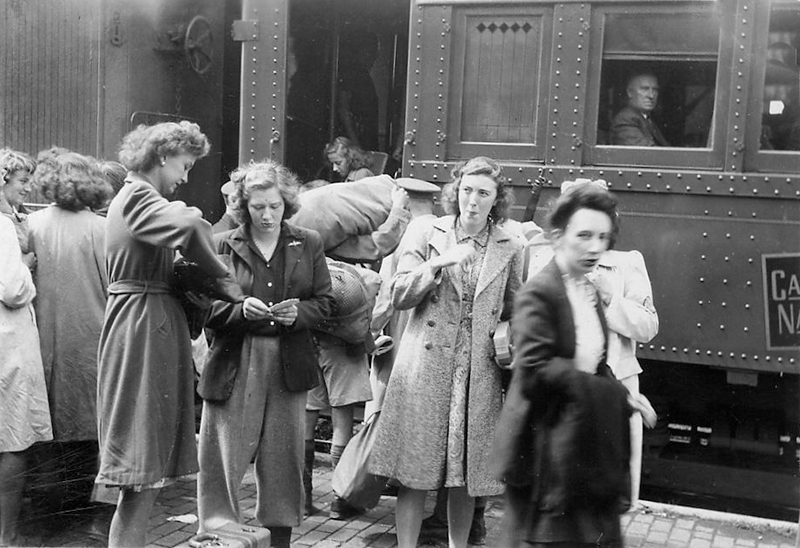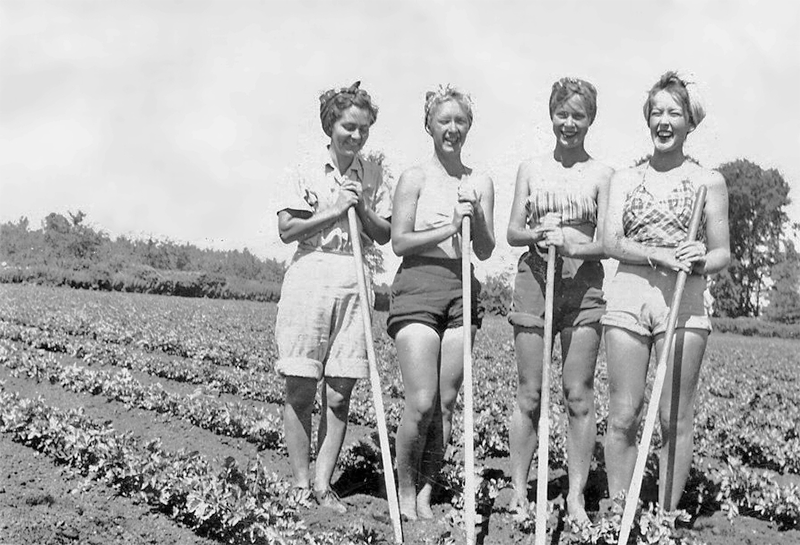Mary (Barnaby) Fountain
1944, Cooksville; 1945, Thedford; 1946, Beamsville
"Attention Girls! The Food Production Front needs Recruits!! Liberating enslaved countries is the job on fighting fronts. Here at
home it is our job to help feed the people of those countries. The Ontario Farm Service Force can use all of you at anytime from May 1st to September 20th."
In 1944, I was 16 years old and I had my National Registration Card. I felt I should answer the call. I obtained an Ontario Farm Service Force pamphlet and application for registration at the G.C.V.I., the Secondary School I attended.
When I got home and read the information, I decided right then and there that I wanted to go to an Ontario Farm Service Force Camp. I got my required medical examination and was pronounced physically fit for farm work by our family doctor. I was inoculated against typhoid fever and the doctor filled out my Medical Certificate form.My parents signed the consent form, I filled out the rest and mailed it off to Ontario Farm Service Force, Department of Agriculture, Parliament Buildings, Toronto.
If a girl had a good standing in school the Principal could release her before school closed for early Camps and she got credit for her school year. But a Farmerette who took advantage of early departure from school was expected to stay on the job at least thirteen weeks during the summer. A certificate required by the Department of Education had to be deposited with the Camp Labour Secretary when she arrived at the Camp. This was returned to her with official verification of duration of service when she left camp.
I did not do this, but volunteered my services after my examinations were over in June.
I was accepted! I was expected to be in Cooksville June 19th. I had farm service badges to sew on the front of my overall's bib and my jacket. I gathered up my working shoes, socks, rubber boots, some of my father's old shirts, a straw hat and bandana. I was ready to ‘Lend A Hand.’ I also packed other clothes for off hours and fun.
[At Cooksville, our] Labour Secretary's nick name was "Dee dee" and I became "Barney", a shortened version of my surname...
I spent a part of the summer at the Thedford camp. It had room for 100 girls. Most of the work was hoeing celery, pulling onions and thrashing them on a big screen. This way the outside skins were removed before the boxes of onions were stacked to dry.
Mary Fountain (in light coat) arriving in Thedford in 1945.
The district farmers took turns driving trucks up to Lake Huron on Sunday afternoons. We went swimming in "Happy Hollow" behind the sand dunes. We were taken to the Ipperwash Pavilion, which was near an army camp, on dance nights. The jitterbug was all the rage. One of our girls and her soldier partner were extremely good at it and were beautiful to watch.
"Tuesday August 14th, 1945. The news came after supper that the war was over V.J. (Victory in Japan) Day." A few days later Mr. Carrothers took a truck load of us to Happy Hollow in the evening so we could go swimming. Everyone was happy that the war was over, but the farm work went on as usual.
Being in the Ontario Farm Service Force was a great experience for me. I liked working outdoors. It gave me a good feeling when I could look back at the end of the day and see what I had accomplished.
When I went home, I missed the girls and camp life. How kind the farm people were to us. I admire farmers whose livelihood depends on the capricious weather and the help they can get to cultivate and harvest their crops. No doubt I, a teenaged city girl, could not work as fast as a mature experienced farm person. But I tried my best to "Lend a Hand."
Reprinted in the book Onion Skins and Peach Fuzz: Memories of Ontario Farmerettes, with permission from “We Lend a Hand - A Farmerette Story” by Mary (Barnaby) Fountain. A1996.89 Farmerettes: Wellington County Historical Society Essays, 1996, held at the Wellington County Museum and Archives.
Shirley Palmer, Mary (Barnaby) Fountain and Dorothy Decan take a break from harvesting Celery.




 Subscribe to this page
Subscribe to this page